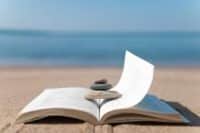
Summer Reading for Science Graduate Students (and Maybe Postdocs!)
It is officially summer (July 4 was this past Tuesday) and things have slowed down as most people take their vacations during the summer months. Invariably, recommended summer reading lists have appeared in print, in podcasts and on radio shows.
One book that may be an interesting read for science graduate students (and possibly postdocs) is a novel entitled “Chemistry” by Weike Wang. I heard about this novel on an NPR radio show during an interview with its author. While I have not read the book (I’m on the downside of my career and no longer an academic), a recent review of the novel suggests that it may be helpful for science graduate students who may be struggling with career options and future career choices. As I mentioned above, it may be a good read for postdocs but they may be too far down the career rabbit hole to benefit from it.
The reviewer, Beryl Lieff Benderly (a professional freelance science writer), offered the following critique:
Though Wang doubtlessly does not intend her debut novel as a treatise on the ills and failings of scientific training at high-powered research universities, she poignantly highlights many of the issues that make that process so trying for so many ambitious and earnest young people. Among them is the “common knowledge … that graduate students make close to nothing and that there are more PhD scientists in this country than there are jobs for them,” Wang writes. In addition, there’s the lab member who “strongly believes that women do not belong in science because [they] lack the balls to actually do science.” And these aren’t even close to the most serious of the protagonist’s challenges.
Further she offers:
Wang clearly wrote this book as a character study, not as an academic analysis of the grad school experience. Still, I suspect that reading it could prove useful to academic officials interested in improving grad students’ often difficult lot. The protagonist appears to receive essentially no meaningful help or guidance in her travails from anyone associated with her university, and officials might do well to consider why this is so and what services could have proved useful.
I’m sure that many of you identify with the premise of the novel and may have even experienced some of the universally-recognized “ills” and “failings” of modern scientific training. That said, while reading the novel may bring back bad memories or make you think about your difficult current situation, it is always helpful to read about others who have shared your experiences and are intimately aware of your current plight. If nothing else, it helps to remind you that you are not alone and perhaps, more importantly you are not crazy!
Enjoy the book and your summer!
Until next time…
Good Luck and Good Job Hunting.
